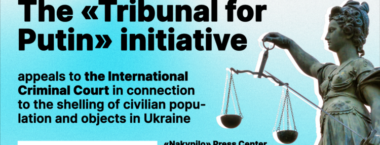The Ukrainian Helsinki Human Rights Union asserts the need to change the provisions of the CPC, administrative and judicial practice in the use of repeated arrests.
The provisions of the criminal procedural legislation of Ukraine allow a situation in which a person, who has been detained by law enforcement agencies, can become a hostage of the vicious circle of arrests and releases from custody without the possibility of effective protection of his/her freedom and security.
We observe such practices in cases of extradition arrest of Oleksandr Karpenko, Meiri Herzel, Zelimkhan Byelharoyev, Shakhban Isakov and others. Chapter IX of the Criminal Procedure Code of Ukraine regulates the issue of extradition. In particular, Article 584 of CPC determines that extradition arrest to secure transfer of a person in future is made according to an investigating judge’s decision in a result of a motion of the prosecutor. As a result of the motion consideration, the investigating judge either applies extradition arrest or refuses to grant the motion of the prosecutor. However, even if the investigating judge releases a detained person from extradition arrest, part 13 of the same article of CCP comes into force, allowing to re-apply extradition arrest to the person in order to transfer it to another state. This provision does not contain any conditions, such as a change of circumstances, new evidence or risk, as well as receiving documents from the government-contractor – needed to address the issue of re-arrest.
The Article creates two practical problems: firstly, it levels out the value of a judgment as a binding, because an investigating judge’s decision on a person’s release from detention has no importance to re-arrest; secondly, the person who is detained according to this Article, can get into the endless circle of arrests and releases, if the prosecution detains the person and files a motion for arrest immediately after the release from provisional arrest – Article 584 of CCP does not contain any constraints on such behavior of police.
The Ukrainian Helsinki Human Rights Union is confronted with the existence of such problems in the case Karpenko v. Ukraine that is being considered by the European Court of Human Rights and has already been communicated. Mr. Karpenko, a citizen of the Russian Federation, was detained in Ukraine with the aim of extradition. The first arrest was followed by four more arrests, each time the Court of Appeal’s judgment on failure to comply with the procedural law and need to release a detainee from custody in the courtroom, Mr. Karpenko was again detained by prosecutors, being subjected to extradition arrest, because of a new motion. All five times the circumstances of the detainee did not change, but the prosecution motion was based on the same arguments. Each arrest of Mr. Karpenko was approved by the investigating judge and canceled by the Court of Appeal, the process of arrest the process began again. In this case and some other cases, the prosecutors and investigating judges gave a broader interpretation of part 13 Article 584 of CPC, requiring re-arrests under the same circumstances, even in the case of release from custody by a higher court – the Court of Appeal. This interpretation, in our view, is contrary to the letter of the law, which allows re-arrest only in the case of release by the decision of the investigating judge. This practice was also used for Zelimkhan Byelharoyev and Meiri Herzel.
UHHRU believes that this practice and the wording of Ukrainian criminal procedural legislation contain substantial violations of the European Convention on Human Rights – of Articles 5 and 13, which set individual’s right to liberty, security, and an effective remedy. They are also contrary to the precedents of the European Court, which speak of the inadmissibility of a state’s broad interpretation of such basic rights as the right to freedom- 1 and necessity of building legislation on detention of the principle of legal certainty- 2, when the effects of the law is predictable, and a person, making specific action, has clearly aware that it will have consequences for him/her- 3.
Legal opinion in Russian is here
Arkadiy Bushchenko, Executive Director of UHHRU
Mykhailo Tarakhkalo, Director of the Strategic Litigation Center of UHHRU
Borys Zakharov, Head of the advocacy center of UHHRU
1 Čonka v. Belgium, no. 51564/99, § 42 in limine, ECHR 2002-I, and Shamayev and Others v. Georgia and Russia, no. 36378/02, § 396, ECHR 2005-III
2 FarhadAliyev v Azerbaijan, no. 37138/06, §146, 9 November 2010
3 Baranowski v. Poland, no. 28358/95, §§ 51-52, ECHR 2000-III



